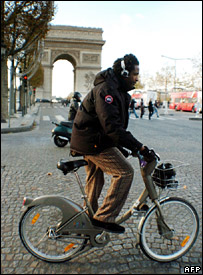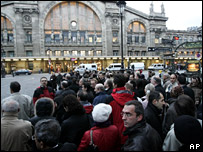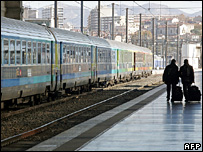|
By Alasdair Sandford
BBC News, Paris
|

French drivers are sometimes not the most polite of people but there was a certain sense of solidarity on the Parisian roads this morning.

Thousands of commuters had to improvise their journey to work
|
Angry horns gave way to politeness as cars edged into reverse to let pedestrians and cyclists cut across the jams. Everyone understood this was not a normal day.
"No worries", smiled the cyclist whose rear tyre I shunted accidentally in trying to squeeze my own bike through the narrow gap between the van and the pavement.
It soon became clear the best way to make progress was to filter down the middle lane and be swept along with the motorbikes and rollerblades.
Car-sharing has caught the media's attention this time, after revelations that during last month's strike the average vehicle contained only 1.3 passengers.
At least one company specialising in matchmaking commuters is having a field day.
Travellers prepared passenger-seat picnics to share with drivers whose faces they usually stare at blankly across crowded railway carriages.
Queues
Those using the successful Velib bicycle-sharing scheme were more numerous than usual.
 |
 The words "cancelled" and "delayed" have been featuring quite a lot
The words "cancelled" and "delayed" have been featuring quite a lot

|
Some thought they had cracked the transport problem only to find there were no free spaces to dock their bikes once they got to work.
At a suburban train station people had huddled round the special information boards to see which trains were running. One man filmed the schedule on his mobile phone.
Here, the disruption was not as bad as had been feared - trains every 15 minutes or so. If anything, the platforms seemed less crowded than usual.

There are fears the nationwide strikes could last for several days
|
But opposite the central Saint Lazare station, a mainline terminus serving several Parisian suburbs and the far-flung Normandy region, the queue at the bus stop was several people deep.
At the station itself, a young man I spoke to did not seem too perturbed as he stared at the departure screens.
The words "supprime" (cancelled) and "retarde" (delayed) have been featuring quite a lot.
But he had plans to avoid the hazardous daily trip home by spending the week at his girlfriend's place in the capital.
Natural phenomenon
Many mainline stations elsewhere in France have been all but deserted.
At Saint-Etienne in the Massif Central virtually no trains were running. The industrial town is known as a bastion of trade unionism.
 |
 Giving way on pensions, the unions argue, would be the thin end of the wedge
Giving way on pensions, the unions argue, would be the thin end of the wedge

|
Moustached union members marched through the streets in the fog, chanting their slogans and holding banners aloft.
At least one poodle was spotted wearing a bright red coat that sported the logo of the CGT union.
Strikes such as these are of course part of the French landscape.
The first 10 minutes of the main lunchtime television news bulletin treated the protest as if it were a totally natural environmental phenomenon.
People were shown dealing with it as they would floods or a storm.
Little green book
Power workers have joined their colleagues from the railways on strike - they too have "special" pension schemes the government says are outdated and must be reformed.

The strike reduced rail services to just a few trains
|
Meeting some union officials, you get a sense of the importance of history.
One showed off his little green book in front of me as if it were the Bible.
The national statute regulating the working conditions of gas and electricity workers dates from 1946.
It covers everything from public holidays to medical treatment in the workplace - hard-earned privileges that these men fear are already being eroded in an era of free-market competition.
Giving way on pensions, they argue, would be the thin end of the wedge.
Such questions may not be on the minds of many Parisians as they try to figure out how to make their way home from work.
Bookmark with:
What are these?